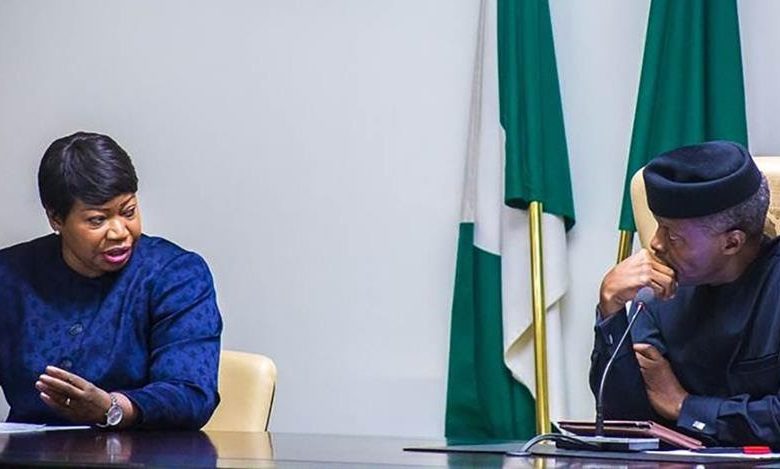ICC Set To Announce If It’s Investigating War Crimes In Nigeria

The International Criminal Court’s (ICC) decision on whether it is opening investigations into war crimes and crimes against humanity committed in Nigeria will be announced in the following week, HumAngle has learnt.
Nigeria’s case at the ICC is currently under preliminary examination. But HumAngled gathered that this is set to change soon as the court’s prosecutor, Fatou Bensouda, intends to take further steps in bringing violators to justice.
In its latest report on preliminary examination activities released in 2019, the Office of the Prosecutor observed that the Nigerian government appeared to have made some efforts to confirm the guilt of alleged perpetrators. It, however, added that the government’s activities were limited in scope and depth.
“To date, the repeated commitment of the Nigerian authorities to provide the Office with relevant information in this respect has not materialised,” it lamented.
The Office then said it would continue to urge the Nigerian government to demonstrate seriousness in investigating and prosecuting identified crimes in 2020. If it failed to do this, it concluded, “the Office will need to come to its own determination with respect to the admissibility of the potential cases it has identified”.
There are currently ten potential cases at the ICC related to Nigeria: seven involving the various Boko Haram terrorist factions and three involving Nigeria’s security forces.
Cases against Boko Haram, for example, include its attack, abduction, and enslavement of civilians population, attacks against education, and the recruitment and use of children to participate in hostilities. Others are attacks against girls and women, attacks against buildings dedicated to religion, and attacks against personnel or objects involved in humanitarian assistance.
The security forces, on the other hand, are alleged to have been involved in the killings, torture or ill-treatment of military-aged males suspected to be Boko Haram members or their supporters in northeast Nigeria. The military is also accused of attacks against the civilian population, and recruitment, use of children under 15 to participate in hostilities under the Civilian Joint Task Force (CJTF) programme.
The ICC had concluded back in 2015 that there was a reasonable basis to believe that both Boko Haram and the Nigerian Security Forces “committed crimes under the ICC’s jurisdiction, including war crimes and crimes against humanity”.
Since then, the Office of the Prosecutor has continued to gather evidence and engage local authorities and stakeholders regarding its findings.
Cases at the ICC go through different stages before judgment is reached and enforced. First, there is the preliminary examination phase where the Office of the Prosecutor determines if there is enough evidence of crimes under the court’s jurisdiction. After gathering evidence and identifying suspects, the Office either drops the case or opens investigations by asking ICC judges to issue arrest warrants or summons for suspects to appear.
Third, there is a pre-trial stage where three judges confirm the suspect’s identity and ensure they understand the charges.
At the trial stage, the prosecution is required to prove its case beyond reasonable doubt. The judges consider the evidence and issue their verdict, which may be appealed by either party. The judges can sentence the accused, if found guilty, to up to 30 years in prison or life imprisonment in exceptional cases, and they can that reparations be paid to the victims.
In its 2019 report, the Office of the Prosecutor had similarly assured the United Kingdom it would conclude preliminary examinations of alleged war crimes by its military personnel in Iraq. On Wednesday, it released its final report where it said: “the only appropriate decision is to close the preliminary examination” and that information provided did not provide a reasonable basis for an investigation.
Its decision in the case of Nigeria, HumAngle however gathered, will likely head in the opposite direction.
Amnesty International had noted in December 2019 that ICC investigation of war crimes committed in Nigeria’s Northeast had become inevitable and urged the court not to waste time.
“The Prosecutor has confirmed yet again that the Nigerian government is not taking steps to deliver justice,” said the organisation’s International’s Research and Advocacy Director, Netsanet Belay.
Belay added that victims have been waiting for justice for over a decade and the Nigerian government has shown an unwillingness to bring perpetrators to book.
“The ICC should have already launched an investigation, but there can be no doubt that the time will come in 2020 for the ICC to step up to its role as the court of last resort,” he said.
Meanwhile, speaking in October concerning the military’s response to the End SARS demonstrations, Nigeria’s chief of army staff, Tukur Buratai, urged soldiers not to be intimidated by threats of charges at the ICC.
“These agitators are falsely accusing the Nigerian Army of being responsible for the activities of the miscreants despite glaring evidence to the contrary. They have continually threatened to report the Nigerian Army to the International Criminal Court (ICC) and also threatened various forms of sanctions against personnel and their families,” the chief of army staff said.
He then added: “[We] have every right under the constitution to carry out assigned and legitimate roles of maintaining law and order in aid of civil authorities and other security agencies.”
Support Our Journalism
There are millions of ordinary people affected by conflict in Africa whose stories are missing in the mainstream media. HumAngle is determined to tell those challenging and under-reported stories, hoping that the people impacted by these conflicts will find the safety and security they deserve.
To ensure that we continue to provide public service coverage, we have a small favour to ask you. We want you to be part of our journalistic endeavour by contributing a token to us.
Your donation will further promote a robust, free, and independent media.
Donate HereStay Closer To The Stories That Matter




